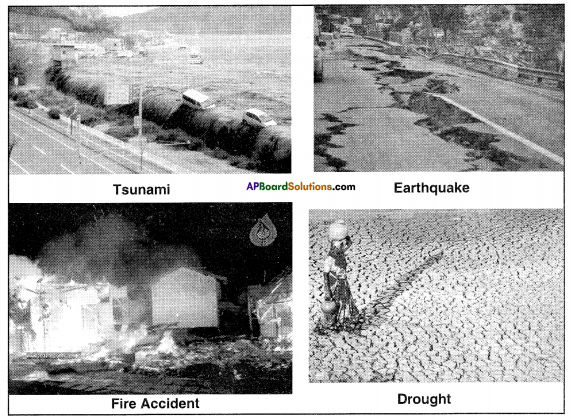SCERT AP Board 8th Class Social Solutions 24th Lesson Disaster Management Textbook Questions and Answers.
AP State Syllabus 8th Class Social Studies Solutions 24th Lesson Disaster Management
8th Class Social Studies 24th Lesson Disaster Management Textbook Questions and Answers
Improve your learning
Question 1.
Describe any disaster that occurred in your area or that you watched on TV. What measures could have been taken to reduce its impact?
Answer:
Recently we had flooded to ‘Budameru’ due to heavy rains. Houses, fields, and roads were inundated with these floods. In our area, 8 persons were missed due to these floods. All the crops were washed out. Many animals were drowned in the water.
We should control the flood by channeling this ‘Budameru’ water to the Krishna river. The people in the danger zone should be sent to elevated areas. Donors should be encouraged to supply them with food and clothing. Drinking water should be supplied to them. Medical facilities should be arranged. Thus we can reduce its impact.
![]()
Question 2.
How can the disaster be prevented/managed?
Answer:
All the living beings except human beings are leading their lives with the nature. But the human beings are changing the nature according to their convenience. This should be avoided. The government should grow mangrove forests, relocate the villages to safe lands, practising and promoting cyclone resistant construction techniques. Thus we can manage disasters.
Village disaster management teams should be formulated and trained. A large numbers of cyclone shelters and mounds should be constructed in strategic locations so as to accommodate villagers in case another cyclone strikes the area. Thus the disaster can be prevented.
Question 3.
Discuss the elder’s experience with regard to the disasters and the management and write a note.
Answer:
Once there was an earthquake in Hyderabad. It was a summer night. All of our family members were sleeping outside in open place. My granny thought that some dog was striking her cot. In seconds we heard shouting ‘earthquake, earthquake’. All of us ran out immediately. One building at the end of the road collapsed. There were some breaches in the walls of the houses. It occurred nearly five to six times. Our colony people sat on the roads with great fear. The next day morning they entered their houses with frozen hearts.
![]()
Question 4.
Suggest the precautions to be taken by the people to face the disasters.
Answer:
Disaster precautions are important in preventing the loss of human lives and minimizing the damage to property during the occurance of a natural disaster. In todays world, there are many types of natural disasters. In some cases, we cannot be able to take any precautions. So safety measures or precautions should be pre-planned before the disaster strikes. How¬ever, some of the precautions to be taken before a natural disaster occurs are listed below:
- The people should be seen that all breakables are stored safely, food stuffs and water are prepared and big items need are on the floor.
- Green vegetations like trees surrounding should be pruned regularly or even cut down, if they are in state for damaging property if disturbed, for e.g. wind.
- In the event that the gas or electricity becomes hazardous, everyday should also familiar-ize themselves with turning off the gas and electricity supply to their houses.
- The originals or copies of valuable certificates like birth certificates, marriage certificates, passports etc.
- The cracks and damage of the house should be checked including the roof, chimneys and foundation.
Question 5.
Mention the effects of a drought.
Answer:
There is a sequential impact of drought:
- Scarcity of drinking water; fall in water-table
- Decline in crop acreage
- Fall in employment in the agricultural sector due to slowing down of agricultural activity
- Fall in purchasing power of those engaged in agriculture
- Scarcity of food grains
- Scarcity of fodder
- Loss of cattle life
- Malnutrition, especially among children
- III health and spread of diseases like diarrhoea, dysentery or cholera and opthalmia caused by starvation
- Distress sale and mortgage of land, jewellery and personal property
- Migration of people in search of employment.
![]()
Question 6.
Mention the occasions where the water is wasted and suggest preventive measures.
Answer:
Occasions where the water is wasted:
- Marriage functions
- Meetings
- Children at home (while playing)
- While carrying water in tanks
- Roadside taps
- While filling water tanks etc.
Preventive measures:
- People should be educated regarding water scarcity.
- Taps should be in good condition.
- There should be alarms to the water tanks.
- Children should be kept away from water while they are playing.
- The outlets of water tanks should be checked in Municipalities and Corporations etc.
![]()
Question 7.
Make an album with the pictures of natural disasters.
Answer:
Natural disasters:

8th Class Social Studies 24th Lesson Disaster Management InText Questions and Answers
Question 1.
Do you know what tsunamis are? How they are formed? How they can be predicted and how you can save yourself if you are residing in any of the coastal districts of the state ? (Textbook Page No. 256)
Answer:
The term “Tsunami” has been coined from the Japanese words ‘tsu’ meaning harbour and ‘name’ meaning waves. Tsunamis are huge waves generated by earthquakes, volcanic eruptions, or underwater landslides which devastate coastal communities. Tsunamis caused by nearby earthquakes may reach the coast within minutes. When the waves enter shallow water, they may rise to several feet or, in rare cases, tens of feet, striking the coast with devastating force. The tsunami danger period can continue for many hours after a major earthquake. With the use of satellite technology, the Tsunamis are predictable. With the cautions given by the department, we will move to the safest places to save ourselves.
![]()